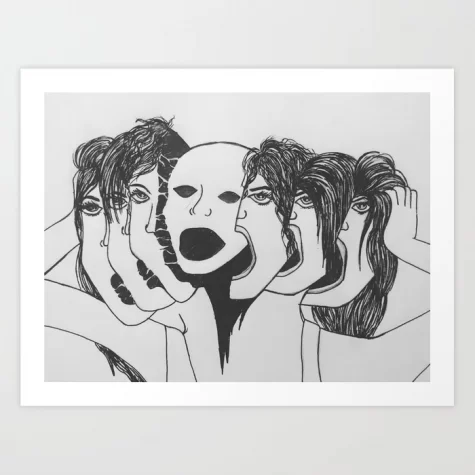A Serious Conversation: What does it mean to have a Mental Health Disorder?
A throughly researched guide to recognizing, diagnosing, and treating the most common mental health disorders.
November 23, 2021

This article of “A Serious Conversation” will cover only a small portion of mental health disorders around the globe. My goal as an author is to get readers this information, so they can get help if they want it. This article may be a trigger for those who suffer from some of these, so please be cautious and stay safe.
For most teenagers, the pandemic has been a withdrawal from their social life, along with how they act and behave in general. Depression has spiked in both teenage girls and boys, raising the numbers to 36% and 19%. Three quarters of those individuals have suffered through major depressive episodes, and only half of those seek and get help. This article will include only a handful of the most common mental health disorders: their symptoms, and how you can reach out and get help.
Depression
Depression comes in many different forms: Persistent Depressive Disorder, Bipolar Disorder, Seasonal Affective Disorder (SAD), Psychotic Depression, and Postpartum Depression are only a few of the many types and varieties that depression can have a hold on someone. Some of these are associated only with specific symptoms. The mood is essentially the main playing piece into diagnosing a human with a depressive disorder. Some typical mood symptoms can be apathy, general discontent, guilt, hopelessness, a loss of interest or pleasure in regular activities, mood swings, and sadness. Behavior can look different as well: varying from agitation, excessive crying, irritability, restlessness, or social isolation. Changes in how one sleeps or eats is something to watch over, as well. Excessive hunger, insomnia, weight loss or weight gain, poor appetite, restless sleep, and fatigue are all possible symptoms of depressive disorders.
As an author, I ask that those who know they are suffering from this to reach out and seek help. Depression has a way of leading people into deeper and more darker holes. A particularly large hole is a whole realm of suicide. Suicidal thoughts are unfortunately more common in teenagers suffering from depressive disorders, and is the second leading cause of death in humans ages 10-33. Before it gets out of hand, talk to a medical professional or a trusted adult about seeking help or finding someone to talk to and help you work through your problems.
Anxiety
Like depression, anxiety has a variety as well: general anxiety disorder (can be listed as severe), Obsessive Compulsive Disorder (OCD), Panic Disorder, Post-Traumatic Stress Disorder (PTSD), and Social Anxiety Disorder are only a handful of anxiety disorders around the globe. Anxiety symptoms can include feeling nervous, restless, tense, having a feeling of impending danger, panic, or doom, having an increased heart rate, sweating, trembling, and having trouble concentrating on everyday work.
Although having anxiety is not the same as having depression, it can also be treated by seeking the right kind of help. Anxiety can also lead to severe anxiety disorder, which can then lead to bigger disorders such as OCD and schizophrenia.
ADHD
One of the most common mistakes that doctors make is misdiagnosing ADHD for anxiety and depression. ADHD stands for attention deficit hyperactive disorder. A close disorder of ADHD is ADD (attention deficit disorder). ADD is ADHD for those who cannot concentrate and have all of the symptoms, but are not hyperactive (the H in ADHD). All of the symptoms of ADHD have all been classified as symptoms of “hyperactivity and impulsiveness”. Some examples of this include being unable to sit still, constantly fidgeting, being unable to concentrate on tasks, excessive physical movement, excessive talking, being unable to wait their turn, acting without thinking, and interrupting conversations.
Children with untreated ADHD may have problems at home or in school. Because ADHD makes it difficult for a child to pay attention, a student with untreated ADHD may not learn everything he/she is taught. Untreated ADHD can also lead to other learning disabilities, anxiety, depression, sensory processing disorder, and oppositional defiant disorder. It is strongly recommended to have children screened in early childhood (before preschool, kindergarten, and the first grade) to prevent early untreated ADHD.
Schizophrenia
The fourth and final mental illness I will cover in this particular article is schizophrenia. Schizophrenia only affects about 1% of adults in the United States. Since this is a very small number, most people do not know exactly what schizophrenia is, or have a very wrong stereotypical perception of it. Schizophrenia has become a “demonized” disease, where people have come to believe that patients with it are possessed — psychosis, personality disorders, and dissociative identity disorder have also been “demonized” for their symptoms.
Schizophrenia is stated to be a chronic and neurological brain disorder. In 2014, it was estimated that 1.1% or 2.4 million adults over the age of 18 would be affected by it. The main types of schizophrenia include paranoid, catatonic, disorganized, residual, and undifferentiated. There is an extremely long list of symptoms for schizophrenia. Some of them include delusion, amnesia, belief that an ordinary event holds personal or special meaning, belief that thoughts aren’t one’s own, disorientation, hallucinations (both auditory and visual), disorganized speech, paranoia, persecutory delusion, or religious delusion.
Yes, most of the time people with schizophrenia know when they have it; however, like most mental illnesses, it is important (and required) that you get a medical diagnosis of it.
Below you can find a number of crisis lines including counseling and clinic lines to potentially test for any of the mental illnesses listed above. It is extremely important to know that every illness listed can be treated. Remember to stay safe. Thank you.
Crisis Lines:
Seward Providence Medical Center – 1+(907)-224-5205
Seward Community Health Center – 1+(907)-224-2273
Glacier Family Medicine – 1+(907)-224-8733
Seaview Community Services (counseling services) – 1+(907)-224-5257









